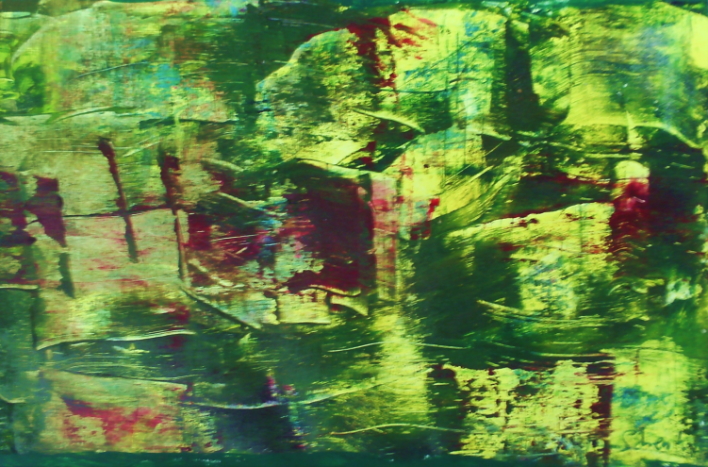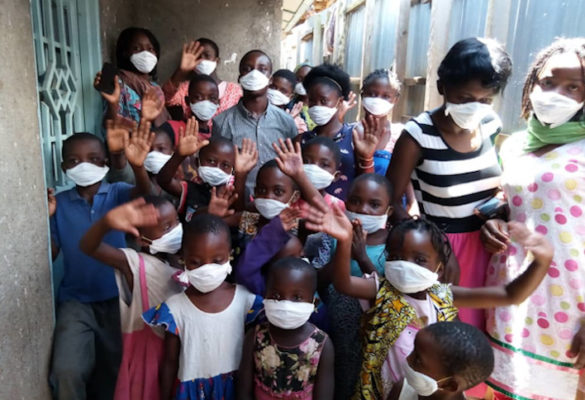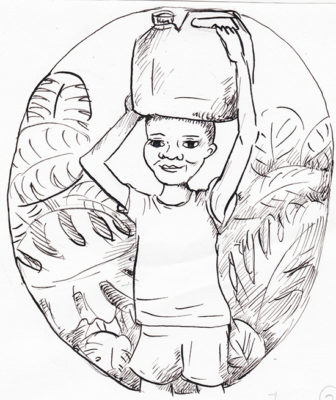Soap, Water, and Helping Your Neighbours

Image above: 2009, acrylic – Joseph Wresinski Centre AR0200703002 © Nelly Schenker
Message from ATD Fourth World members in the Democratic Republic of Congo.
Today everyone is living in uncertainty and slow motion. But for people experiencing poverty even before the pandemic, suffering is just getting worse. Now the burdens of daily life are even heavier. At this time, we want to talk about how important it is to stay close to one another, but especially to those who are most vulnerable. We need to face this pandemic together. When people working to leave no one behind come together in their efforts, their collaboration encourages others in a powerful way.
Fearing a rapid spread of the disease, the government of Democratic Republic of Congo has taken measures to protect citizens. In the city centre, people know about basic protective measures. However, this information has not reached outlying areas that are lacking in resources. In some places outside the city, there are no roads or bridges, no health facilities or even electricity. Soil erosion often threatens people’s homes. We were especially concerned about families in these communities who are not getting reliable information.
Small teams bring information to remote areas
As soon as the pandemic reached this country, we organized small teams to visit isolated families in areas furthest from the city. We had, of course, heard the message:
“Protect others by protecting oneself”.
In other words, learn about the virus and follow all the health and safety rules that everyone else is observing. So we put together information on the virus — how it spreads and what to do if you experience symptoms. And we trained ourselves on how to share this important information with other people.
Currently these small teams are travelling to remote areas. There we talk with families about the virus, but also about what safety protections might look like in their communities. Over the years, we had lost contact with some families, but our recent visits have been an opportunity to try to find them. So, despite the mud at this time of year, we climbed the mountains of Cikera and Mushekere to look for these families.
Essentials are out of reach due to price increases
The people we have met are very interested in information about the virus. But they also tell us the challenges they face in protecting themselves. Not only can they not afford the products needed to disinfect themselves and their homes, but it is even harder now to get drinking water. A can of water, which used to cost between 50 and 100 Congolese francs, now costs 200 francs or more. While the government placed a freeze on water prices for the most vulnerable households, the measure has not been enforced for people in the deepest poverty. This is one more injustice inflicted on those who can least defend themselves.
We urged local community leaders to stop water providers from over-charging so everyone could have access to water, especially now that it is even more critical to survival than usual. Soap is also desperately lacking in these neighbourhoods, so we are taking it to families who are most in need.
We visit home after home. Providing information is important, but we also want to make sure people don’t feel like they are facing all these problems alone. Through our visits, we want to figure out together how to approach all the challenges this new situation presents.

Helping children adapt to the new situation
When we visit families, we also spend time with the children, most of whom are members of Tapori. As we have fun with the children we also practice basic protective measures together, while the parents observe with great interest. Since the beginning of March, schools have been closed. The children must remain confined in their compound.* For them, “collective confinement” means helping one other fetch water and wood, or building small villages together with modelling clay.
We continue to bring these children news about Tapori because we know how important it is for them to be in touch with other children. One mother told us she thinks Tapori provides a terrific opportunity for children because it encourages them to follow their dreams.
Support among neighbours helps people feel they are not alone
Through phone calls, we also stay in touch with groups working in other parts of the country such as Goma, Uvira, and Kavumu to encourage one another. These groups are also making efforts to develop collaboration among people. We all know that in addition to basic health measures, mutual support among community members is one of the most effective weapons in this struggle.
Our visits and our on going relationships in these remote areas reminds us of a critical part of our work with people in deep poverty. As Rosine says, “When we are visiting families, we’re not just providing information about the virus. We are also strengthening bonds with the parents and children; we all feel like we are part of the same family.”
“Our movement is not bureaucratic”, Emmanuel adds. “We build a life together, a family that recognizes everyone.”
* In Democratic Republic of Congo, a group of families often live in a collection of small homes surrounding a common yard.

Download the Tapori story of Irenge, from the Democratic Republic of Congo. Tapori stories are about children who strive to build peace and friendship in their communities.

